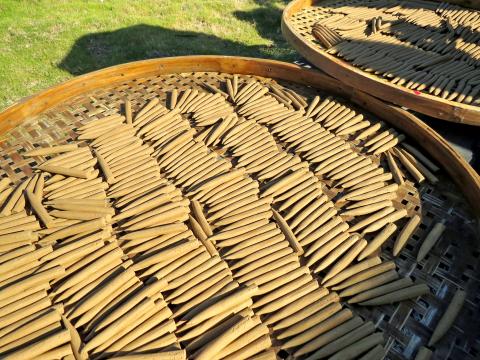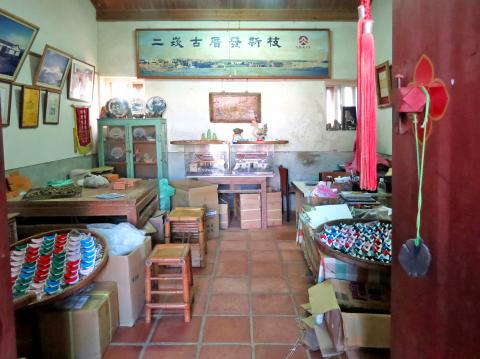Four years ago at his father’s request, Andrew Chen (陳怡碩) resigned from his job running a 7-Eleven in Greater Kaohsiung. Now he runs the family business, making sticks of mosquito-repelling incense out of his ancestral home in Erkan (二崁), Penghu County.
Erkan is located on Siyu (西嶼) islet of the Penghu archipelago. The village is remote and petite, home to about 70 people during the summer and 20 the rest of the year.
“It’s quiet out here,” Chen said. “I don’t really mind. I used to spend summers in Erkan as a boy and my memories were always fine.”

Photo: Enru Lin, Taipei Times
REPELLING ‘EVIL SPIRITS’ AND MOSQUITOES
Chen lives at the back end of the village for most days of the year. He sells sticks of Erkan Incense (二崁傳香) out of his home and more recently online.
These are amber-colored sticks that drive away “mosquitoes and evil spirits” when lit, Chen said.

Photo: Enru Lin, Taipei Times
The active ingredient is mugwort (艾草), a natural insect repellent native to Penghu County. The two other ingredients, firewheel (天人菊) and Hibiscus Taiwanensis (山芙蓉), release a warm and pleasant fragrance.
Chen and his staff harvest and dry the plants, then grind them into a fine powder. Water is added so that the powder becomes malleable and can be pressed into sticks.
After that, each batch is dried under the sun and packaged with a hand-molded clay incense holder in the shape of a boat. When the incense is mounted, its smoke looks like a tendril of steam curling from a ship into the sky.
Chen says his father created the concept and the incense recipe about 14 years ago.
“My father got this store started and then he got much busier and needed help. He asked if I would come, and I said yes,” he said.
GOING HOME
Chen, 41, grew up in Greater Kaohsiung, though his ancestors were some of Erkan’s earliest settlers.
His grandfather moved the family out of the village to find work. Like many young men of Erkan, he went to Taiwan proper to take an apprenticeship at a Chinese herbal medicine apothecary.
“A few Erkan youth needed to make a living and went to Taiwan to study herbal medicine. They opened stores, and over time they helped more people from Erkan go over and learn,” Chen said.
In 1994, Erkan was selected for government-funded preservation and some former villagers returned, mostly to participate in the Erkan Clan Preserve Association (二崁村聚落協進會).
Chen’s father, Chen Rong-yi (陳榮一), joined the association and was appointed chairman in 2000.
The Erkan Clan Preserve Association has been trying to boost tourism by developing the creative and cultural industries.
It converted a disused cowshed into an art gallery, filling it with sculptures made by residents. During the summer, Erkan’s one-room preschool sometimes offers lessons in praise song, a local musical tradition.
The low-rise Minnan-style homes, about 50 in total, are also open to visitors during the day. At the front door, residents hawk small wares such as ink stones, herbal teas and cold almond milk.
“He wanted to bring meaningful economic life to Erkan, but to make it truly special, too. A lot of Taiwan’s old streets thrive but have to sell many of the same things. He didn’t want Erkan to become another old street,” Chen said.
For information about the village, visit www.erkan.org.tw.

Exceptions to the rule are sometimes revealing. For a brief few years, there was an emerging ideological split between the Democratic Progressive Party (DPP) and Chinese Nationalist Party (KMT) that appeared to be pushing the DPP in a direction that would be considered more liberal, and the KMT more conservative. In the previous column, “The KMT-DPP’s bureaucrat-led developmental state” (Dec. 11, page 12), we examined how Taiwan’s democratic system developed, and how both the two main parties largely accepted a similar consensus on how Taiwan should be run domestically and did not split along the left-right lines more familiar in

This month the government ordered a one-year block of Xiaohongshu (小紅書) or Rednote, a Chinese social media platform with more than 3 million users in Taiwan. The government pointed to widespread fraud activity on the platform, along with cybersecurity failures. Officials said that they had reached out to the company and asked it to change. However, they received no response. The pro-China parties, the Chinese Nationalist Party (KMT) and Taiwan People’s Party (TPP), immediately swung into action, denouncing the ban as an attack on free speech. This “free speech” claim was then echoed by the People’s Republic of China (PRC),

As I finally slid into the warm embrace of the hot, clifftop pool, it was a serene moment of reflection. The sound of the river reflected off the cave walls, the white of our camping lights reflected off the dark, shimmering surface of the water, and I reflected on how fortunate I was to be here. After all, the beautiful walk through narrow canyons that had brought us here had been inaccessible for five years — and will be again soon. The day had started at the Huisun Forest Area (惠蓀林場), at the end of Nantou County Route 80, north and east

Specialty sandwiches loaded with the contents of an entire charcuterie board, overflowing with sauces, creams and all manner of creative add-ons, is perhaps one of the biggest global food trends of this year. From London to New York, lines form down the block for mortadella, burrata, pistachio and more stuffed between slices of fresh sourdough, rye or focaccia. To try the trend in Taipei, Munchies Mafia is for sure the spot — could this be the best sandwich in town? Carlos from Spain and Sergio from Mexico opened this spot just seven months ago. The two met working in the